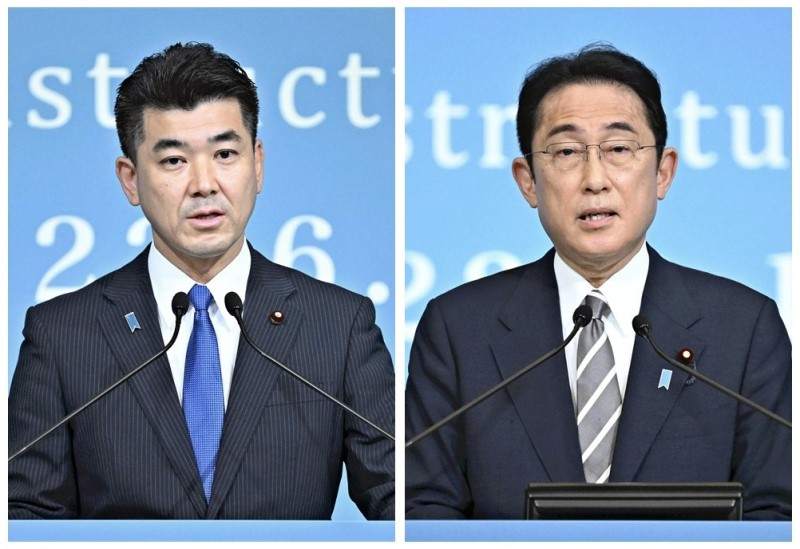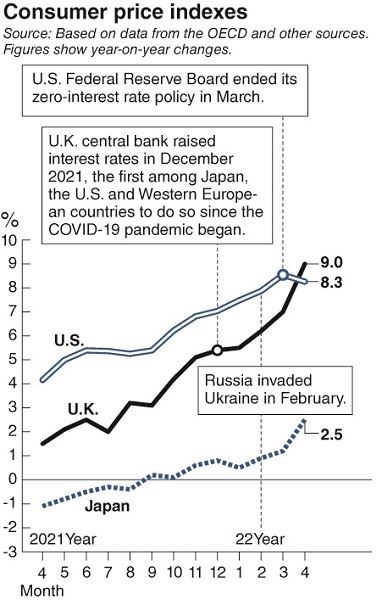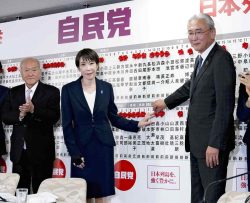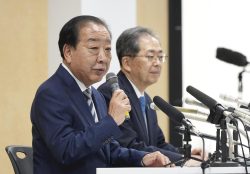
Prime Minister and LDP President Fumio Kishida, right, and Kenta Izumi, leader of the opposition CDPJ, speak at an inaugural meeting of the national congress “Reiwa Rincho” held in Minato Ward, Tokyo on Sunday.
20:00 JST, June 20, 2022
Reflecting the situation both at home and abroad, political parties have emphasized measures to cope with soaring prices and national security policy in their campaign pledges for the upcoming House of Councillors election.
“We are the ones who will deal with various challenges, one by one, regarding the economy, society, and diplomacy and security, and create a new era,” Prime Minister Fumio Kishida, who is also president of the ruling Liberal Democratic Party, stressed on Sunday.
Kishida was speaking at the inaugural meeting of the national congress “Reiwa Rincho,” comprised of interested persons from various sectors.
The parties’ top priority in the upcoming upper house election is dealing with price increases triggered by Russia’s aggression in Ukraine. The election will be officially announced on June 22, with voting and ballot counting to take place on July 10.
The ruling and opposition parties differ, however, on how specifically to deal with rising prices. The LDP and Komeito stress such measures as giving subsidies to business operators, while opposition parties argue strongly for direct assistance to consumers.
The government has been holding gas prices down by giving subsidies to petroleum distributors, and both the LDP and Komeito advocate in their campaign pledges for maintaining this approach. They have also made clear that they will help improve people’s lives by giving preferential tax treatment to companies that have raised workers’ wages, and financially assist businesses struggling to keep going amid price increases.
In contrast, opposition parties are advocating a cut in the consumption tax.
Kenta Izumi, president of the opposition Constitutional Democratic Party of Japan (CDPJ), emphasized at the Sunday meeting that his party “is readying a proposal that the consumption tax should be cut for a limited time, something the Kishida administration has not referred to.”
The CDPJ has also advocated ¥10,000 in rent support for people leasing an apartment or house, and the Democratic Party for the People (DPFP) has touted a uniform provision of ¥100,000 to members of the public to help them cope with price increases.
Both of these parties are additionally calling for the government to mobilize the trigger clause, a measure to temporarily lower the provisional portion of gas taxes when the average retail pump price remains high. Nippon Ishin no Kai (Japan Innovation Party) has proposed abolishing the provisional portion of the taxes.
Yet, both the ruling and opposition parties have remained unclear about how to secure funds to implement these steps.

An artist illustration : Consumer price indexes
Source: Based on data from the OECD and other sources. Figures show year-on-year changes
Amending top law
Their campaign pledges are also characterized by their detailed pledges in the area of security, apparently out of concern that a situation like the one in Ukraine could occur in East Asia, too.
The LDP and Ishin have fixed their aim on doubling defense spending to an amount equivalent to 2% of the country’s gross domestic product, on par with that of member countries in the North Atlantic Treaty Organization.
While saying they will not focus on the amount involved, Komeito and the CDPJ showed their understanding of the need to improve the country’s defense capabilities. The Japanese Communist Party opposes a build-up of defensive strength on the grounds that it would “lead to the vicious cycle of an arms race.”
Regarding the Constitution, more parties have referred to specific things that should be amended in the top law, apparently in light of the situation in Ukraine and the COVID-19 pandemic.
Like the LDP, Ishin has called for stipulating the existence of the Self-Defense Forces in the Constitution, and for creating a clause to deal with emergencies. Komeito said the party will “move ahead with discussing” the idea of having the SDF stipulated in a clause separate from Article 9, whose Paragraph 2 prohibits the nation from having armed forces.
The DPFP has included in its campaign pledges the idea of creating a provision to extend Diet members’ terms as a special measure in times of emergency, in order to keep the Diet functioning.
The CDPJ has advocated the idea of “discussing the Constitution,” though it has said it is not considering it “on the assumption of amending the law.” The JCP opposes constitutional amendment based on a pledge that the party will “defend all the provisions in the top law.”
Top Articles in Politics
-

LDP Wins Historic Landslide Victory
-

LDP Wins Landslide Victory, Secures Single-party Majority; Ruling Coalition with JIP Poised to Secure Over 300 seats (UPDATE 1)
-

CRA Leadership Election Will Center on Party Rebuilding; Lower House Defeat Leaves Divisions among Former CDPJ, Komeito Members
-

Japan Tourism Agency Calls for Strengthening Measures Against Overtourism
-

Voters Using AI to Choose Candidates in Japan’s Upcoming General Election; ChatGPT, Other AI Services Found Providing Incorrect Information
JN ACCESS RANKING
-

Japan Institute to Use Domestic Commercial Optical Lattice Clock to Set Japan Standard Time
-

Israeli Ambassador to Japan Speaks about Japan’s Role in the Reconstruction of Gaza
-

Man Infected with Measles May Have Come in Contact with Many People in Tokyo, Went to Store, Restaurant Around When Symptoms Emerged
-

Prudential Life Insurance Plans to Fully Compensate for Damages Caused by Fraudulent Actions Without Waiting for Third-Party Committee Review
-

Woman with Measles Visited Hospital in Tokyo Multiple Times Before Being Diagnosed with Disease

























